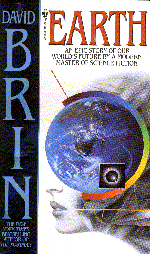|
Earth
Copyright 1990 by
I first read this in 1993 and most recently on the 28th December 2002 Forty years in the future, climatic changes have redrawn the surface of our planet. Areas that were once lush and livable are now wastelands. Conversely areas that were once uninhabitable are now open for colonisation. Around the world, giant enclosed habitats are being created. These 'arks' are populated with endangered species that no longer have any hope of survival outside a controlled environment. In this future, the World Data Net has spread the principles Of Freedom of Information persuasively around the world. Secrecy is a dirty word. Governments can no longer maintain their secret armies, secret policies and secret bank accounts. Indeed the Gnomes of Zurich are no more: Switzerland was destroyed in the last battle of the new free world. Jen Wolling is biologist. She's a Nobel laureate. She's the founder of the Gaia ecological movement. However, she's an old woman now and her views have diverged from the both the conventional and the activist outlooks. She rather enjoys upsetting everybody with her outrageous opinions Currently Jen is spending her time thinking about competitive evolution and how it applies to consciousness. Her ideas will prove to be critical elements as the novel unfolds. Alan Lustig is Jen's nephew. He's a successful, brilliant scientist in his own right. However, he's made something of a mistake in his research. He's unfortunately dropped a microscopic black-hole into the Earth's core, and it's orbiting beneath the mantle, acquiring mass. If this bad news gets out, he'll become infamous the world over. Further investigation reveals good and bad news. The good news is that Alan's little black hole is too small to maintain itself and it will slowly fade and die. The bad news is that there was already a second black hole in the Earth's core. This anomaly is much bigger and it will not fade away. As it absorbs mass from the core, it grows, and as it grows, it absorbs more mass, and so on until the earth itself is consumed. Only six months remain before its destructive effects begin to tear our planet apart. Alan is certain that the creator of this deadly black-hole must be some vestige of one of the old national governments and although they no longer have their old military might, they're certain to come down very hard on anyone who a secret of this magnitude. This was fairly interesting the first time around. I like David Brin. I enjoyed "Startide Rising" and of course I absolutely love "The Postman". However, reading this novel a second time for this review, I almost gave up. It's slow, the characters are uninteresting, the waffling preface to each chapter was just a distraction and, bearing in mind there's only six months left for human life on the planet, there's almost no tension, no sense of panic, no drama. While writing this review I actually found it unpleasant picking the book up to check on notes I'd made. I will not be reading it again. I should mention that there are some good thoughts about the nature of consciousness, and, for a 1990 book, he's anticipated the popularity of the Internet quite nicely. His World Data Net is populated with autonomous software agents ferreting out secrets and invading people's email, so that's pretty accurately foretold. Or maybe he just read John Brunner's "Stand On Zanzibar" and "The Shockwave Rider", of which I was frequently reminded while reading this novel. What's it got? earth-shaking disasters, artificial intelligence, space shuttles (including the HOTOL just another in the long line of missed-opportunities by the British Government), zeppelins and fly-wheel buses. Loaded on the 31st January 2003.
|
|





